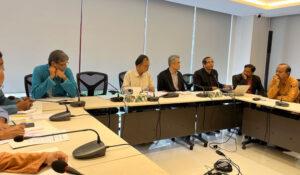
The Centre for Policy Dialogue (CPD), in partnership with Better Works Bangladesh (BWB) and International Labour Organization (ILO), organised a workshop titled ‘Responsible Business Conduct and Productivity Enhancement’ on Sunday, 24 March 2024, at the CPD premises. The objective of the workshop was to disseminate information regarding Responsible Business Conduct (RBC) to workers’ organisations and solicit valuable insights from their representatives on RBC.
The workshop was attended by 24 participants, representing organisations such as the National Coordination Committee for Workers’ Education (NCCWE), the International Trade Union Confederation (ITUC), the IndustriALL Bangladesh Council (IBC), as well as officials from CPD and ILO.
In his introductory remarks, Dr Khondaker Golam Moazzem, Research Director, CPD, discussed the background of RBC. He highlighted that labour rights are gaining increasing prominence, with global soft standards transitioning into enforceable laws. RBC plays a pivotal role in empowering governments, workers, and employers to uphold labour rights. It encompasses addressing all human rights-related issues within workplaces and extends across the entire value chain. RBC not only mitigates risks but also expands access to new markets, thereby enhancing productivity for employers.
Moreover, it fosters worker satisfaction, consequently boosting worker productivity. In sectors like garment production, RBC has contributed to increased exports. Defined as businesses that prioritise societal, economic, and environmental considerations, RBC goes beyond profit motives, aiming to enhance global quality of life. This involves providing environmentally safe, ethically sound, and equitable working conditions and products. Achieving responsible business practices necessitates collaborative efforts from all stakeholders, including workers, employers, and governments.
‘Bangladeshi factories previously adhered to RBC due to compliance laws and pressure from foreign buyers. However, the government of the buyers now also exerts pressure on them to uphold RBC standards’ said the Programme Manager of Better Works Bangladesh, Mr Mohamad Anis Agung Nugroho.
In his keynote presentation, Dr Khondaker Golam Moazzem, highlighted the correlation between RBC components and productivity, and said ‘Dialogue, empowerment, and transparency have resulted in a 7 per cent decrease in staff turnover at factories. Increased wages have also boosted profits for firms in Vietnam and Indonesia. Employer-supported childcare has reduced the rate of sick leave by 9 per cent in Jordanian factories. Compliance with wage and working hour regulations has led to an increase in average revenue.
Additionally, workers in factories with RBC meet production targets up to 40 minutes faster. Furthermore, having female representatives and training female supervisors has resulted in a 22 per cent increase in productivity.
Mr Hasnat M Alamgir, Ph.D, Director, Career & Professional Development Services and Professor, Department of Pharmacy Southeast University, discussed about stakeholders’ capacity in implementing RBC in Bangladesh. He elaborated that their implementation challenges stemmed from policy and institutional deficiencies, legal and regulatory gaps, as well as challenges in certification and oversight.
‘Policy incoherence and jurisdictional ambiguities among ministries worsen RBC enforcement challenges’ underscored the Professor. Furthermore, the judicial system, including labor courts, faces significant backlogs, resulting in delays in addressing labor grievances. Additionally, certification agencies in Bangladesh lack comprehensive RBC coverage.
After the keynote presentations, participants took part in an online quiz and a question-and-answer session, fostering interactive engagement and the exchange of opinions and insights. Following this, they participated in a group discussion, divided into three groups, tasked with identifying challenges and proposing solutions for implementing RBC in Bangladesh. One group focused on legal and regulatory issues, another on institutional challenges, while the third addressed operational concerns pertaining to employers and workers.
By the end of the workshop, the participants gained knowledge and better understanding of RBC, and had explored potential solutions to the current challenges.


